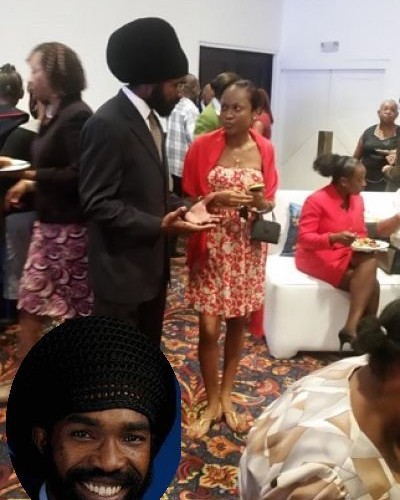
TECH TALK: Weekes, in convo with JAMCOPY’s Simone Bailey at the Pegasus-hosted conference.
When aviation pro Troy Weekes launched his kid-friendly online learning platform EZ Learner in his native Barbados circa 2009, he was smartly focusing on the bigger picture: ultimately taking his brilliant idea to the rest of the Caribbean and the Diaspora. So said, so done, and today his creation, which fuses technology and education, with marked emphasis on Caribbean culture, is a hit with students and education officials alike. There’s more to come. The thirty-something “Haile Selassie-ite” (an anointed Rastafarian) presented a master class on the final day of the just-concluded digital publishing conference The Online Mind inside the Jamaica Pegasus’ Legacy Suite, where TALLAWAH rapped with him about thinking big, technology’s key role in regional development, and why a conference like The Online Mind is right on time.
TALLAWAH: Troy, what led you to start your online platform EZ Learner?
Troy Weekes: I come out of an aviation, computer-science background, where my specialty was the user-friendliness of cockpits to reduce the workload for the operator. I completed my Masters in Human Factors at Florida Institute of Technology in 2005, and upon returning to the Caribbean, I decided to apply my skills to designing an education system online. In my area of specialty we create platforms to speed up the creative process in high-risk environments, so I thought, Why not use it to help advance the systems catering to the education of young children? So that’s how EZ Learner came about; it came to market around 2011. But while I was working on that I was still doing consultancy work in aviation, like working with a team on the certification of safety management systems at the Grantley Adams International Airport.
TALLAWAH: Did EZ Learner’s rapid growth and acceptance over these past four years surprise you?
T.W.: That was the plan all along. We started out with one application centred on creative writing and composition writing. Now we have four applications, which are all integrated. And that’s just one aspect of the growth. We started out with a pilot programme of five schools in Barbados, then we moved to Trinidad for a pilot of about six schools. Then we went to St. Vincent and the Grenadines to do the same thing. We’ve also targeted the Diaspora in North America and the UK.
TALLAWAH: I read that you also reached out to Jamaican education officials. How did that go?
T.W.: In late 2014, we were asked to adapt EZ Learner for the Tablet in Schools programme as a content provider. And subsequent to that involvement we now have a Version 2 of EZ Learner on the market. Our programme focusses on indigenous Caribbean content to help kids across the region retain their heritage.
TALLAWAH: How can Jamaicans make the most of digital publishing opportunities to match your level of success?
T.W.: The first thing I would recommend is that you do research on the market needs and refine the idea that you’re passionate about. It has to be something that meets market demand. Another way to succeed is in this area is to build partnerships and connections with like-minded people and associate with similar entrepreneurs from across the region.
TALLAWAH: How would you summarize your experience of participating in this inaugural Caribbean digital publishing conference, The Online Mind?
T.W.: It was a revelation to me, in terms of the high volume of the publishing industry here in Jamaica, and the great work that JAMCOPY has been doing. In Barbados we don’t have anything like this. So a conference like this is ideal. This was a conference of players from different sectors creating an atmosphere of diversity and showcasing a range of products that we can bring to the world. They complement each other. It’s a recipe for renovation, with new markets to be penetrated – and a catalyst for regional integration and development.
TALLAWAH: How often do you visit Jamaica?
T.W.: Not often enough (Laughs). I first came here in 2013 through a World Bank programme called Pitch It Caribbean, and then I was here again for Digital Jam 2.0 in 2014.
TALLAWAH: What’s been happening in Barbados in recent times?
T.W.: [The government] recently relaxed a ban on cellphones in schools. There’s been a kind of shift taking place in terms of integrating technology in the classrooms. But there’s been a positive move as it relates to EZ Learner creating life-changing opportunities for students using it.
Source: Tallawah Magazine
